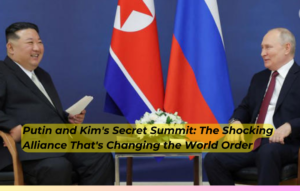In Seoul, examiners have noticed that the new highest point between Russian President Vladimir Putin and North Korean pioneer Kim Jong Un, while bringing about some pragmatic collaboration, essentially fills in as a way to send an advance notice to their enemies.
The two chiefs, alluding to one another as “confidant,” cemented their fellowship during the culmination. Their discussions and tours of Russia’s cutting-edge space launch facility were accompanied by meetings involving their defense ministers.
Both Russia and North Korea are keen to demonstrate that, despite their geopolitical isolation, they possess reliable partners. Additionally, they aim to undermine U.S.-led sanctions and pressure campaigns—Russia in response to the Ukraine conflict and North Korea regarding its nuclear and missile programs.
According to Duyeon Kim from the Center for a New American Security, Putin and Kim benefit not only from potential transactional agreements but also from the geopolitical message their cooperation sends. They wish to convey that their nuclear-armed nations are cooperating militarily and to caution America’s allies and like-minded partners supporting Ukraine. Kim accepts Kim Jong Un is additionally motioning toward Washington, Seoul, and Tokyo that Russia upholds him in Upper east Asia.
While the two nations deny U.S. cases of intending to trade weapons, they have vowed to extend guard collaboration. Putin even offered Russian assistance in building satellites for North Korea. Leif-Eric Easley, a professor at Ewha University in Seoul, suggests that if their intent was merely a secret arms deal, a face-to-face meeting would not have been necessary. He asserts that Putin and Kim’s diplomatic display aims to assert their success in challenging the U.S.-led international order, reducing dependence on China, and increasing pressure on rivals like Ukraine and South Korea.
Conversations including expected infringement of U.N. Security Chamber goals concerning North Korea could demonstrate a loss of motion of significant global organizations, cautions Andrei Lankov, a Korea master at Seoul’s Kookmin College. This highest point might imply the downfall of Safety Committee goals connected with North Korea and any endeavors to punish or stop its atomic program. Lankov believes it establishes a significant precedent likely to be adopted by various major international players: the notion that if a UNSC resolution is unfavorable, it can be disregarded.
In terms of providing advanced technology, Lankov speculates that Russia might be cautious about giving North Korea technology it could eventually lose control over. However, their overt signaling of defense cooperation sends a strong message to South Korea, discouraging direct military aid to Ukraine.
Despite pressure from Kyiv and Washington, South Korea has limited its assistance to Ukraine to non-lethal aid, substantial arms sales to neighboring Poland, and the provision of artillery shells to the United States, while maintaining it has no intentions to supply lethal aid.
In light of perceived threats, it is plausible for Russia, North Korea, and China to seek mutual support through partnerships or alliances to counter the United States. Nonetheless, Mason Richey, a professor at Hankuk University of Foreign Studies in Seoul, points out that each of these countries has a history of struggling to make such relationships work. Trust among dictatorial leaders such as Xi Jinping, Kim Jong Un, and Vladimir Putin is a challenging obstacle to long-term, concerted alliance formation. While it may be in their interests, cooperation among dictators remains a difficult endeavor.

